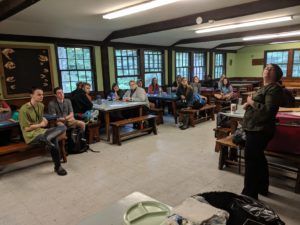The Camp Staff Has Been Trained
It is day five of our staff-training week down at Cedar Lake and we are busily preparing for the arrival of our campers. It has been nearly 10 months since the campers left last season and there is only one more weekend between the camper’s arrival and us. The education team is excited and can hardly wait for a new crop of youth to join us to start their journey of becoming conservationists.
Over the course of the week, our staff have gone over camp policy, practiced wilderness survival skills, learned the history of our historic camp facility and even had a few bonfires to practice the traditional jokes, skits and songs that we will perform each night during the campers visit. On day three, they spent time on our archery and rifle ranges honing the skills of the staff in the art of instructing safe and responsible firearms and archery practices. Having all of our staff on the range is an opportunity to let the first time shooters learn from our range instructors. Learning from peers is an integral part of our training experience so everyone is on the same page once the campers arrive. At Cedar Lake, we strive to provide opportunities for growth for our campers and staff alike.

On days two and four our staff got down to business focusing on science. One of the unique things about our camps is the connection and engagement to the natural resources we try to instill in our campers. So while our campers are learning technical skills they are also being immersed in conservation science and why natural resource management matters. In order to instill this knowledge, our staff must first learn the nuances of teaching it. This year we have staff from several different states so they will be learning about Michigan ecosystems and animals for the first time as well. Water chemistry, bog ecology and forestry were all covered. They also learned the usual suspects you have heard me talk about including Michigan mammal and waterfowl id.
Although the time spent at camp is a time for the kids to learn, it is also important for us to have FUN! Summer camp is about being outside, playing predator-prey games, chasing lightning bugs and sitting around the bonfire each night. Therefore, our staff also gets to partake in these activities all in the name of “research” to find the best way to facilitate these games for when the kids arrive next week.
Overall staff training is an exciting and exhausting time. We throw a large amount of information at our staff and hold them to a high standard when it comes to things like camper safety and behavior management. They spent this week preparing, but there will still be lessons to learn once the campers arrive.
With a great staff-training week behind us, it is time to open the gate. Bring on the campers!
The post The Camp Staff Has Been Trained appeared first on Michigan United Conservation Clubs.
Recent Posts



